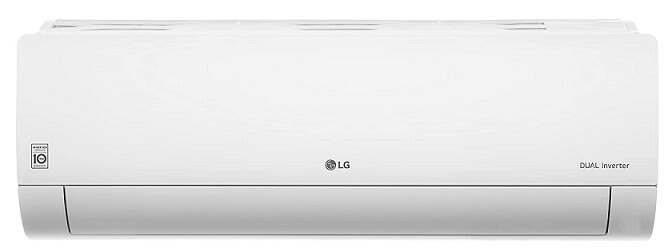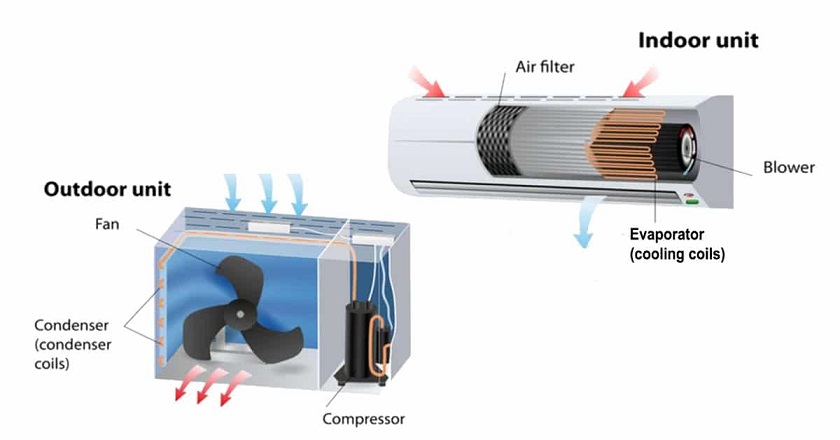Does your air conditioner work on the latest inverter technology? We all know that inverter AC units offer faster and consistent cooling when compared to regular devices.
If you want to learn how an inverter AC achieves this, you should read the article till the end.
In this write-up, we shall discuss what an inverter technology is, how and why it is energy efficient. To help you gain better insights on this topic, we will even talk about the working mechanism of the inverter AC, its advantages and disadvantages.
By the end of this article, you will be equipped with all the information you need to know about these appliances.
Let us get into the discussion to know why an inverter AC is worth buying.
What Is An Inverter Air Conditioner?

The inverters vary their frequency, to control the flow rate of the cooling agent. This further allows for the even distribution of cool air across the room while minimizing power consumption.
Inverter technology in AC units is the most sought and highly favored technology for energy efficiency and variable capacity operation. These appliances operate at maximum capacity as soon as they start, maintain a steady room temperature, and give a higher comfort level. That means less energy requirement, less electricity consumption, and less maintenance.
How Does an Inverter Air Conditioner Work?

Let us now try to understand how an inverter air conditioner works. As mentioned above, the compressor works on the ON and OFF principle. That means it starts and keeps working on the maximum capacity until it reaches the desired room temperature. After achieving the required temperature, it turns off automatically. This way, it keeps operating in an ON/OFF mode, i.e., higher capacity or nothing.
The thermostat of the unit plays a crucial role here in the working process. In a non-inverter system, the compressor shuts on whenever there is a change in the temperature set on the thermostat. It shuts down immediately after the room attains the thermostat temperature.
It would start again if there is any change in the room temperature than the one set on the thermostat. This is a cycle, which repeats continuously as per the cooling in the room. Hence, it consumes more electricity.
When coming to an air conditioner with inverter technology, the compressor does not turn off. Instead, it adjusts its speed according to the room temperature. Whenever the temperature is not in sync with the set temperature, the compressor operates at maximum capacity to cool the room. Once the room reaches the set temperature, it runs at a low speed to maintain consistent cooling in the room. This way, it runs uninterrupted by adapting the load or cooling capacity of the room. This results in reduced usage of electricity by the device.
The inverter technology allows the compressor to start at a lower voltage without putting extra pressure on the motors. This facilitates efficient energy even when running at a medium capacity. You can save about 30-50% on the electricity bills of your inverter AC in comparison to a normal AC unit.
The other advantage of using an inverter AC is that it allows the unit to alter its tonnage based on the room size. Additionally, the compressor converts the AC input power to direct current (DC) power first to comply with the power input’s variable frequency. This is something you don’t find in non-inverter or normal ACs.
To know more “How Air conditioner works” Read Here
What are the Advantages and Disadvantages of an Inverter AC?
Let us try to explore the merits and demerits of using an air conditioner with inverter technology.
Advantages of Inverter AC
- The compressor in the inverter technology air conditioner does not turn on and off abruptly.
- Since the inverter AC keeps the room temperature constant throughout, you can sleep more comfortably in a room with such a unit. The temperature remains steady inside.
- The inverter ACs help in minimizing the electricity bills by consuming less power.
- The compressor of the inverter AC does not make a loud noise when starting, running, or stopping. Since it operates at variable speeds, it is very quiet.
- The air conditioning units with inverter technology are energy efficient. Hence, they have a lower operational cost than other non-inverter ACs.
- The inverter ACs have the capability of cooling the room comparatively at a higher rate than the non-inverter air conditioners.
- Inverter ACs have a filtration process that helps in getting rid of pollutants, allergens, dust, and even odours inside the room.
- In case of a power cut, the inverter AC does not require any reset after the power resumes.
- If you are using solar power for your air conditioning unit, then inverter ACs are the best and affordable option.
Disadvantages of Inverter AC
- Inverter air conditioners have a high upfront cost which is significantly more when compared to other non-inverter ACs.
- In case of any repair, the costs incurred on the repairs and maintenance are higher than the non-inverter AC units.
- The cooling efficiency may rduce if the temperature outside is very hot, i.e., about 46 degrees.
- Whenever there is a leakage of the refrigerant, the compressor may operate at maximum capacity. This will lead to more power consumption.
- If the AC capacity is lower or you have a large room, the compressor will have to work more to keep the room cool. Because of the prolonged running of the compressor, it will intake more power. This further results in a spike in the electricity bills.
Is Inverter AC Slow In Cooling?
An air conditioner with inverter technology provides faster and consistent cooling when compared to regular devices. Initially, they run at a maximum speed to attain the desired room temperature. Once the room reaches the required cooling level, the compressor starts operating at the normal speed. Because of this optimum speed, the room achieves faster cooling than other non-inverter ACs. Only at the beginning of the operating process, these devices require more power. Later, they adapt to the load in the room and adjust the intake of power supply, consuming less electricity. Undoubtedly, the inverter ACs are the best air conditioning units for your home.
As discussed earlier, the inverter AC compressor does not stop after reaching the desired room temperature. Instead, it slows down its speed and keeps the cooling constant inside the room. An inverter AC never slows down in cooling, even when operating at lower speeds. Let us say you had a power cut when the AC was running. After the power resumes, you don’t have to reset the device again.
The inverter technology in the AC unit regulates the refrigerant flow rate as per the load or cooling capacity inside the room. When the heat is less, it lowers the coolant flow rate. When there is more heat inside the room, it increases the circulation speed of the refrigerant.
Another advanced feature from the air conditioners with inverter technology is optimum cooling. These appliances provide optimum cooling or regulate their cooling as per the room temperature. Let us assume the temperature in the room is high, or there are more people in the room. This advanced technology works smartly by increasing the cooling capacity of the room. Likewise, if the room temperature is lower than required or the room has a less number of people, the inverter AC instantly lowers the cooling capacity.
Is It Worth Buying An Inverter AC?
You may ask us, is it worth buying an AC with inverter technology? Here is the answer for you. Inverter ACs are very expensive than the other conventional ACs. Moreover, they have higher upfront costs and maintenance costs. Also, the spare or service parts of these appliances are higher.
However, these points are less significant when you consider the energy efficiency, performance, functionality, and the longer life span of the units. Above all, you can save a huge amount in terms of electricity bills.
Hence, it is up to you to decide whether you want to go for an inverter AC or not. If you want to save in the long run, and budget is not a constraint, an inverter technology AC is your best bet. If you feel that you are spending too much on a single piece of equipment, you better go with a conventional air conditioner.
Conclusion:
To wrap up, an inverter technology air conditioner is the best choice to save on your electricity bills. Although it has a huge upfront cost, it is worth the investment. I am sure this article cleared the air for you and helped you get all the necessary information on inverter AC units.
Now that you know everything about these appliances, choose the best AC with inverter technology for your home needs.
Write to us in the comments section below if you find this article informative and helpful. Let us know if we missed out on any points or if you have something to add. Do let us know if you would choose an inverter AC for your home by posting them in the comments.
We would love to hear from you.
Stay home, Stay healthy and Stay safe!!!

